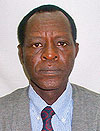I recently visied Lycée de Kigali, the second largest secondary school in the country after Groupe Scolaire, Butare, and I was impressed by the progress in our education system. The Head of the school, an American-trained teacher known as Mr. Martin Masabo struck me as exemplary in matters of efficiency and customer care.


I recently visied Lycée de Kigali, the second largest secondary school in the country after Groupe Scolaire, Butare, and I was impressed by the progress in our education system.
The Head of the school, an American-trained teacher known as Mr. Martin Masabo struck me as exemplary in matters of efficiency and customer care.
After the usual pleasantries, I asked my question: What makes the school tick, with such excellent academic results every year? Indeed, last year’s ‘O’ Level results were excellent, with many students scoring distinctions in Mathematics and English language.
However, before he answered my question I had already obtained part of the answer from the environment. From the main entrance, what strikes visitors is the high level of cleanliness, and orderly discipline exhibited by students and staff.
Compared to the last time I visited the school ten years ago, the atmosphere was impressively quiet for the over 1,500 population of smart and polite young boys and girls.
More modern hostels have been constructed to accommodate more students and the old buildings refurbished; and sports facilities and fields in good condition. What requires attention is the western wing of the campus that requires fencing.
The Headmaster informed us that the school was staffed with qualified teachers to whom he attributed the success of the school. The parents’ active role in the affairs of the school also contributes to the success of the school especially in terms of discipline, according to Masabo.
He conducted us on a tour of the school. The tour, aimed at answering my question, pinpointed vital functions of the school starting with the library, which Masabo calls the heart of any educational institution.
The Lycée’s library is impressive, with a sitting capacity of 250 students, shelves for books, magazines and newspapers, offices and stores and is manned by a KIE-trained librarian with two assistants.
The library is reasonably stocked and we found eager readers supervised by librarians and teachers. The reading culture being promoted, according to Masaba, is supported in all schools by the Ministry of Education.
Currently the curriculum department in the ministry is supplying textbooks to all schools in the country. We found many boxes of new textbooks from various publishers like Macmillan, Longman, Heinemann and Fountain Publishers (a locally registered firm involved in publishing school books tailored to the Rwandan School curriculum) at the Lycée’s library.
The librarian, who was classifying the new books, told us, "Now students will have more access to textbooks. Previously, a book like this one on ‘European History’ was shared by over 40 students because we only had two copies, but now we have 30 copies”.
Masabo however, pointed out that there were few English language readers which are vital in teaching language skills and hoped the ministry would address the matter as promised.
When contacted on phone Mr. Charles Gahima, the Director General of the National Curriculum Centre confirmed the ministry’s commitment to equip schools with books and other scholastic materials, when informing us on phone that this "is a big project. We are supplying books to all government aided schools and in some cases we commission academicians to write appropriate books in areas like entrepreneurship, written according to the Rwandan context”.
He added that this was a move from the previous system whereby students had to rely on teachers’ notes. "Today the curriculum requires the learning to be student-centered, so students need reading materials in order to do their own research,” he said. Mr. Gahima explained that the schools will be allocated money to purchase readers and other reading materials of their choice.
He noted, "We are doing all we can to promote reading and literature in our schools but we still lack Literature teachers”. (the KIE Literature Department performance contract should include training enough teachers in the field).`
We found a fully operational Science Laboratory, a clean kitchen equipped with a drinking-water tank for students. The teaching of science is different from what it was a few years ago. Students and their teachers carry out experiments unlike in the past when science subjects were taught theoretically.
In 1996, I was part of a team that included British education experts trying to ascertain laboratory needs in the country. To our surprise only a few schools had laboratories but even where they existed they had no equipment and were not in use. In some cases the keys to the labs could not be found for us to inspect them.
A few days after visiting Lycée de Kigali, I visited Nyagatare Secondary school where I am a parent and found similar facilities. On the laboratory notice board I found a timetable outlining the use of the laboratories by various classes; and the library was in use.
According to Mr. Edward Kabare, the Curriculum Development Centre had sent a list of books that were available and the school is required to requisition for the books they need. Kabare also confirmed the ministry’s pledge to send money for the purchasing of books of their choice by the end of next month.
My visits to the schools confirm two things: our education has come a long way and will certainly achieve greater heights. We just need to set clear goals and work conscientiously. As the Kiswahili saying goes, pole pole ndiyo mwendo.


